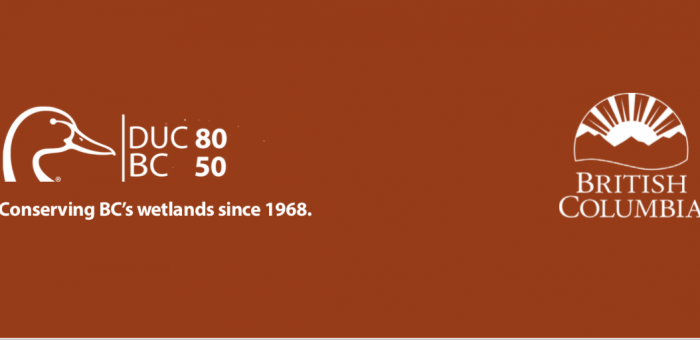Celebrating Ducks Unlimited Canada’s 80 years in Canada and 50 years in BC
Today I had the distinct honour of attending Ducks Unlimited Canada’s 80 years in Canada | 50 years in BC Celebration at the Delta Ocean Point Resort in Victoria. George Heyman, the Minister of Environment and Climate Change Strategy, Andrew Wilkinson, the Leader of the Official Opposition and I each were asked to speak for a few minutes. Below I reproduce the text of my speech.
Text of Speech
Thank you. It’s a distinct honour for me to be here tonight at the Ducks Unlimited 80 50 Anniversary Celebration and I am grateful to be given the opportunity to say a few words.
While I am not a member of Ducks Unlimited, I am in fact the proud owner and winning bidder of two Ducks Unlimited prints from the Ross Bay Pub.
I picked up “Morphing Landscape” by Derek Wicks a couple of weeks ago and it now stands behind my desk in the BC Legislature. Prior to that I obtained Kevin Johnson’s pencil art print “Endearing Moments – Mother Seal and Pup”.
Prior to becoming the MLA for Oak Bay – Gordon Head and the leader of the BC Green Party, I was an atmosphere-ocean-climate scientist, with a background in applied mathematics and physics, at the University of Victoria.
As a scientist I come from an environment where decisions flow from evidence.
But I’ve found it challenging at times over my last five years in the legislature watching so much of the opposite occur — the so-called decision-based evidence-making wherein ideological positions are taken and evidence is sought after the fact to support them.
Never is this more prevalent than in wildlife, watershed and environmental management.
While the concept of science-based wildlife and environmental management has generally been endorsed by governments in B.C., it has not been consistently followed.
There have been some successes. But as you likely know all too well, its selective use has led to many more poor outcomes.
Numerous wildlife populations and ecosystems are in jeopardy today. Mountain caribou are facing extirpation, wild salmon – a foundational species – are in shocking decline, spotted owls are virtually extinct, moose populations are in trouble across the province, and Shorebird populations have declined by an estimated 70 per cent across North America since 1973.
What we find in almost all of these instances is that there has been inadequate science, particularly concerning the cumulative impacts of human activity, and that an unacceptable loss of vital habitat has occurred. For wetlands, in particular, the situation is critical.
Our province lacks a wetland policy and in developed areas of the province, over 80 per cent of fresh water and tidal wetlands have already been altered or destroyed.
Things are not going to get easier. The management of ecosystems is becoming increasingly complex and fraught with risk.
Habitat loss is mounting.
The human population is growing.
Industrial development is expanding.
Adding to all these other stressors is, of course, climate change.
Our climate is changing at an unprecedented rate. And it will continue to do so. Rising temperatures are drying up wetlands and receding glaciers threaten their long-term regeneration.
A recent analysis of data from the Gravity Recovery and Climate Experiment (GRACE), a NASA-led mission that combined 14 years’ worth of satellite data, shows that the global water supply is rapidly shifting. In Canada that has made some regions wetter and more flood-prone. While others, like the western sub-Arctic, have become much dryer.
We must be prudent and precautionary as we manage our changing wetlands because so much is at stake.
Those declining shorebirds I mentioned earlier, for instance, are among the many who rely on wetlands, open landscapes and shorelines for their survival. These are the same areas your members and volunteers are working so tirelessly to protect.
As one of Canada’s greatest science reporters, Margaret Munro, writes:
“The birds are so tuned to the natural pulse of the planet that they know where and when to touch down on their ultramarathon migrations. As the climate shifts and key habitats shrink and degrade, researchers say the migrations are growing more dangerous, and more deadly. Many long-distance migrants are in serious decline.”
Effective natural resource management is reliant on funding, science, and social support. We seem to have consensus on this within the current B.C. government, but it needs to be put into action.
My colleague Adam Olsen organized a forum in April to speak to experts about his proposal to create a Wild Salmon Secretariat in B.C. Your Director of Regional Operations, Les Bogdan, generously made the trip to be there.
Fins and feathers working together, he said. He also said something that mirrors my experience in the BC legislature: we are planning nature to death. We have so many plans, we need to start implementing them. We need to get on the ground and get to work.
Where governments have failed in that regard, Ducks Unlimited and its community partners have excelled.
Your service to BC over the last 50 years has been incredible. By protecting wetlands and shorelines, you are protecting the people and animals who live in here, preserving our water quality, moderating the effects of flood and drought, and providing a buffer against climate change.
As an organization I hope you continue and expand this important work. As a government I hope we can follow your lead.
Thank you for all of your hard work, and congratulations on your incredible success.
Comments are closed.




